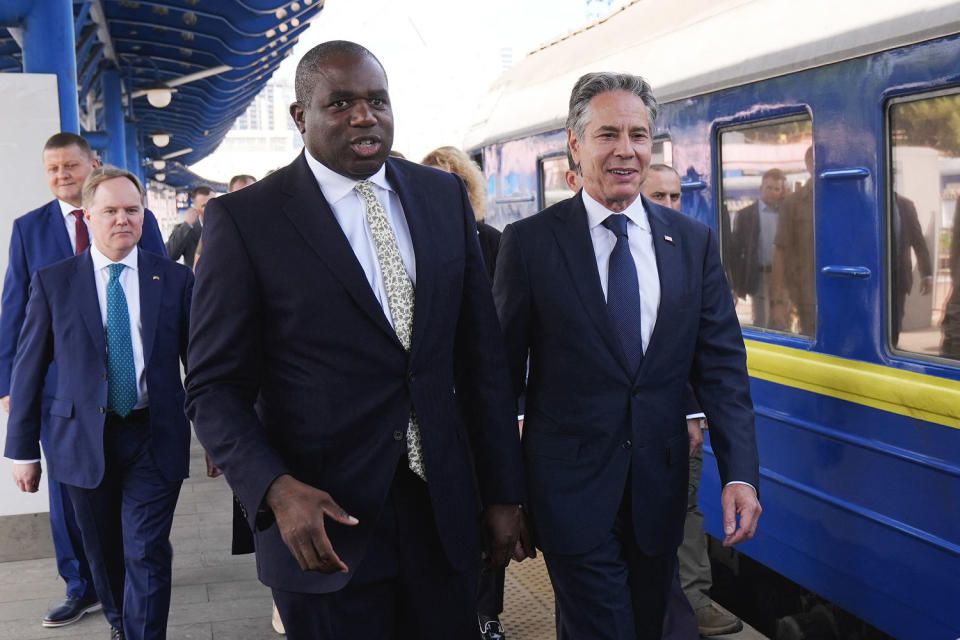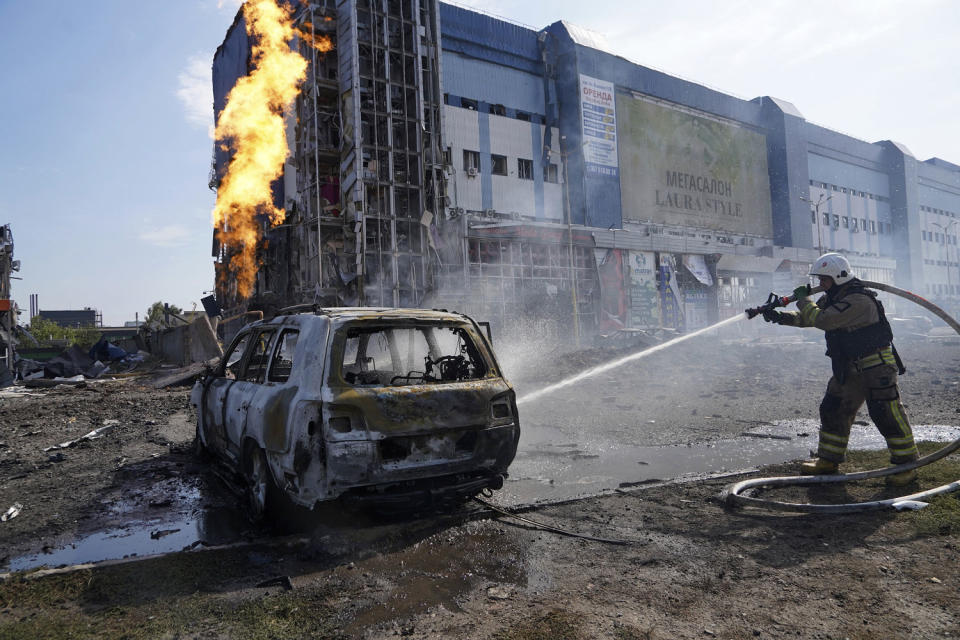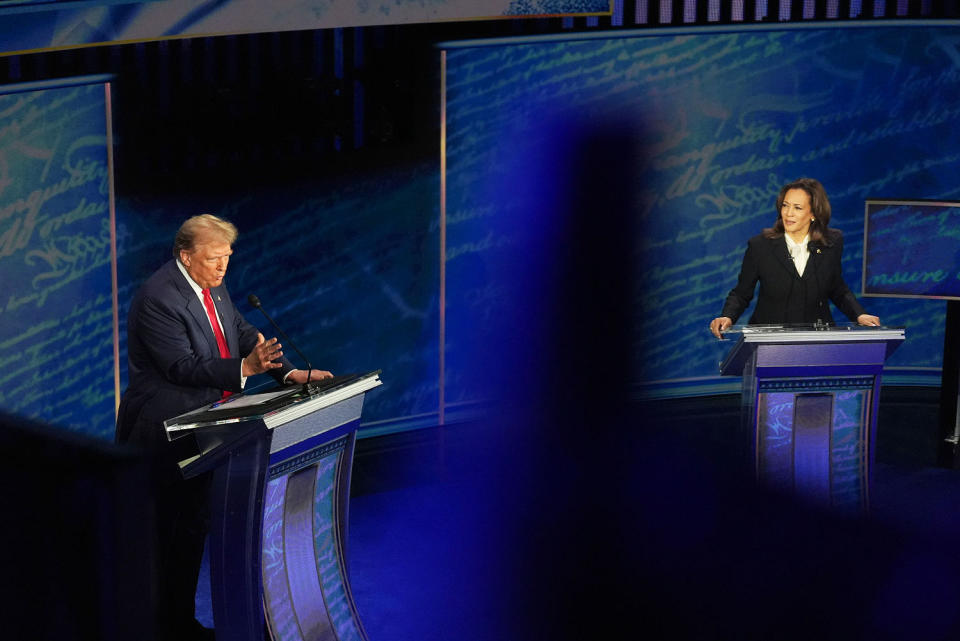KYIV, Ukraine – Ukraine woke up on Wednesday to a dazzling display of the possible expansion – and possible limits – of American aid.
Hours after former President Donald Trump refused to say whether he wanted a US ally to win the war against Russia, Kiev welcomed Washington’s top diplomat, hoping he would bring a long-awaited change to its use of long-range weapons.
Secretary of State Antony Blinken’s visit offered a show of support at a critical moment in the conflict, while the timing provided a contrast to Trump’s comments, perhaps the most significant foreign policy moment in his presidential debate with Vice President Kamala Harris.
But in Ukraine, many eyes were focused on Blinken’s arrival and whether it would be news that the United States would allow its ally’s military to use Western-supplied long-range weapons to strike deeper into Russian territory.


Kiev has pushed for the policy shift, frustrated that Western restrictions have left its hands tied as it fights to hold on to the region on two fronts: the 500 square kilometers it captured in its daring incursion into Russia’s Kursk border region, and strategic cities on the eastern front lines in the eyes of Moscow’s military.
President Joe Biden hinted Tuesday that Kiev might get what it wants after months of resistance from the White House.
“We’re looking into it right now,” Biden told reporters when asked if the U.S. plans to lift restrictions on Ukraine’s use of long-range weapons.
U.S. support for Ukraine was voiced on Tuesday night by Harris, who told Trump that Russian President Vladimir Putin would “eat you for lunch” and that if Trump was in the White House when Moscow’s forces invaded in February 2022, “Putin would be sitting in Kiev right now.”
But the clash also offered signs of how fragile support might be.
Trump was asked twice whether he wants Ukraine to win the war or not, but both times he ignored the question. “I want the war to end,” he said, adding that he was negotiating a deal with Moscow and that he wanted to “save lives.”
Trump has previously said he would end the war within 24 hours of becoming president, without giving details.
His response could fuel fears in Kiev that the Trump administration would withdraw US support and seek to end the war on terms favorable to Russia.
Kiev-based economic analyst Svitlana Guseva followed the conversation and told NBC News that she found Trump’s comments “triggering.”
“I understand that there will be no help,” Guseva, 53, said in a phone interview, talking about a scenario in which Trump returns to the White House. “But I want to say that Kamala Harris also does not have a clear position on peace. Yes, his party continues to support Ukraine, but I heard nothing about peace and how he would achieve peace.
He said Blinken’s visit on Wednesday gave him hope for a “step forward” in long-range strikes. The matter is extremely important for Ukraine, Guseva said, because Kiev must be able to adequately respond to Russia’s own attacks deep inside its country in order to achieve “some kind of compromise” in the future.


“Boxing on the Titanic”
While Kiev may anxiously await the results of the November elections, the Kremlin has downplayed the difference between the two candidates.
In a tongue-in-cheek comment last week, Putin claimed he supported Harris in part because of his “infectious” laugh.
It was widely seen as his latest mischievous intervention, given Trump’s history of praising the Russian leader and mounting signs that he would not continue US support for the war effort in Ukraine.
And Foreign Ministry spokeswoman Maria Zakharova said Wednesday she doesn’t understand why the conversation was a big deal, likening it to a boxing match on board the Titanic.
“Who do you think won? Does it make any difference?” Zakharova told the Russian news agency Radio Sputnik, “There are 15 minutes left until the iceberg.”


Kremlin spokesman Dmitry Peskov said later Wednesday that it was clear the United States “maintains a negative, unfriendly attitude toward our country” regardless of party politics.
The Kremlin did not follow the debate live, he said, but noted that both candidates mentioned Russia and Putin. “Putin’s surname is used as one tool in the internal political struggle in the United States,” Peskov added. “We really, really don’t like it. We hope they leave our president’s name alone.”
Asked what Russia’s reaction would be to the U.S. lifting its restrictions on the use of long-range weapons in Ukraine, Peskov told reporters that such a decision had probably already been made and that Moscow would react “appropriately,” though he said a “special military operation” “as the Kremlin calls its war in Ukraine, is the answer to “all these actions”.
Moscow has warned several times about the consequences of such a decision.
“Russia is protesting against continued U.S. permits. It’s threatening, it’s flailing, but this doesn’t translate to much concrete retaliation based on past evidence,” said Christopher Tuck, a conflict and security expert at King’s College London.
“Militarily, however, extending the authorizations is likely to create only a temporary advantage for Ukraine, as past evidence also suggests Russia is adapting to the new threat,” Tuck added.
Daryna Mayer reports from Kyiv and Yuliya Talmazan from London.
This article was originally published on NBCNews.com


